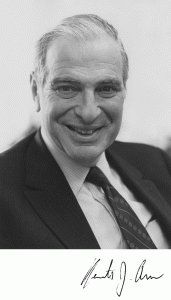
Kenneth Arrow. Portrait provided by Stanford University © Linda A. Cicero/Stanford News Service
Nobel Prize-winning economist Kenneth Arrow was a leading figure in the field of economic theory. Although he passed away in 2017, we only learned of this more recently, in the compilation of the IMS Scientific Legacy Database. Arrow was an IMS Fellow, among his many honors.
—-
It is not an exaggeration to say that Kenneth Arrow’s first (intellectual) love was mathematical statistics and this was consolidated by working under Harold Hotelling, one of the three original voting fellows of the IMS at its founding in Ann Arbor, in September 1935; Hotelling, for whom Arrow had profound respect, was not only a member of the Editorial Board of the Annals of Mathematical Statistics, but was also a past president on the IMS. It is, therefore, not surprising that Arrow was elected as a Fellow of IMS!
Kenneth Arrow was a pure New York bred and educated intellectual, of proud Jewish heritage; born in 1921, he was educated at Townsend Harris High School in New York City and his undergraduate studies in Social Science, with a major in Mathematics, were at the “poor man’s Harvard,” viz City College of New York. Arrow was influenced by two outstanding pioneers in the field of computability theory and mathematical logic, respectively: Emil Post and Alfred Tarski.
Staying in New York, Arrow did his master’s and doctoral degrees at Columbia University, in mathematics and economics, with Hotelling for the former and with A.G. Hart for the latter. He obtained the master’s degree in 1941 and graduated with the doctoral degree in 1951, with some of the interim years spent in war service, research and consultancies (the last two to supplement his modest income).
Among the reasons he was chosen to receive the Nobel Memorial Prize in Economics, in 1972 (shared with Sir John Hicks), were that he provided the welfare economic underpinnings of General Competitive Analysis (the title of his highly successful and timely book with Frank Hahn). That paper was published in the Berkeley Symposium on Mathematical Statistics and Probability, edited by Jerzy Neyman (Arrow, 1950). His contribution to the founding of — in his brother-in-law, and fellow Nobel Prize winner in economics, Paul Samuelson’s words — mathematical politics, i.e., social choice theory, was also developed before his PhD! Only fix-point equilibrium theory was left for a later Econometrica paper (Arrow & Debreu, 1954).
Especially in the years 1956 to 1958 Arrow was concerned with computational issues in mathematical economics, to the extent that, in his Presidential address to the Econometric Society (Arrow, 1957), which was remarkable because he was only in his late 30s, he considered computational methods as pivotal to any decision problem in economics.
Indeed, many of the concepts and tools that he worked with, and made famous, had their first airing in this lecture: equilibrium, optimality, efficiency, convexity, rationality, information, competition, utility, approximation, time, uncertainty, the principle of optimality [Rufus Isaacs with his “tenet of transition” may have been earlier], rules-versus-discretion in economic policy, (linear) programming, and more. I believe that his work in trying to understand optimal inventory policy is in the same league as his path-breaking contribution to medical insurance. A master theoretician, Arrow’s theoretical insights were tempered by practical feasibility — in economic policy, of a social and political nature.
His academic life, as a member of faculties, was spent at Harvard and Stanford universities. At Stanford, he played a major role in founding the department of Operations Research. As a member of the Cowles Foundation he was briefly also in the Department of Economics at the University of Chicago, in addition to being a consultant at the RAND Corporation in Santa Monica. When he retired from active duties at Stanford in 1991, he was the Joan Kenney Professor of Economics and Operations Research.
Arrow was active, as a member, Fellow, Council Member or President, in numerous academic societies. He was awarded numerous prizes by academic and professional societies and lectured widely, as visiting professor and invited distinguished lecturer, at prestigious US and foreign universities and institutions.
Arrow always “asked the hard questions” (pace Auden) but in a simple, even disarming, way.
Kenneth Arrow died on 21 February 2017 in Palo Alto, California.
—
Written by K. Vela Velupillai
This obituary draws a great deal on those Vela wrote for the Biographical Memoirs of Fellows of the Royal Society (Vol 67, 2019) and Nature (Vol 543, 2017); we thank their editors.
References
Arrow, K. J. (1950), Extension of the basic theorems of classical welfare economics, pp.507–532, in: Proceedings of the Second Berkeley Symposium on Mathematical Statistics and Probability, edited by Jerzy Neyman, University of California Press, Berkeley and Los Angeles.
Arrow, K. J & G. Debreu (1954), Existence of an Equilibrium for a Competitive Economy, Econometrica, 22(3), pp. 265–290.
Arrow, K. J. (1957), Statistics and Economic Policy, Econometrica, 25(4), pp.523–531.
Velupillai, K. Vela (2017), Kenneth J. Arrow (1921–2017), Nature, Vol. 543, 30 March 2017, p. 624.
Velupillai, K. Vela (2019), Kenneth Joseph Arrow: 23 August 1921–21 February 2017, Biographical Memoirs of Fellows of the Royal Society, Vol. 67, pp. 9–28.